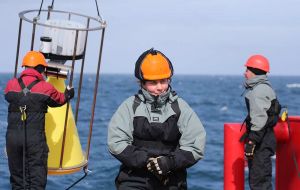MercoPress. South Atlantic News Agency
BAS joins project to overcome shortage of berths for scientific researchers in polar regions
 Dr Sophie Fielding at work on the RRS Discovery
Dr Sophie Fielding at work on the RRS Discovery British Antarctic Survey has teamed up with the National Oceanography Centre and the University of Glasgow to champion the FindAScienceBerth project, funded by the Natural Environment Research Council. The project will open up more opportunities for early career researchers and technicians, particularly from traditionally excluded groups, to join science research cruises, breaking down barriers for conducting fieldwork in marine science.
The project will run for six months, at which time the team will develop tools to build a transparent system to advertise available berths on scientific expeditions.
Berths for scientists on research ships are often in short supply, with participation often limited to specific networks within the discipline, which can be limiting for those pursuing careers in marine science. Although berths can be at a premium, there are other occasions where ships may sail with free berths still available, for example where sampling requirements on an expedition are at a maximum but do not require a large number of scientists to complete.
To explore this, the project team conducted an analysis of expedition reports from the NOC’s British Oceanographic Data Centre (BODC), which revealed that at least one expedition per year between 2010 and 2020 had less than 65% occupancy of science berths. Therefore, capacity already exists to increase the number of opportunities available for early-career researchers and under-represented groups to gain marine science experience.
To ensure these opportunities are not lost going forward, the FindAScienceBerth project, which is part of the NERC EDI Digital Sprint Project, will see the development of a tool in the Marine Facilities Planning (MFP) website.
NOC’s Dr Eleanor Darlington, who will be overseeing this part of the project, said: “The tool will be integrated into the existing comprehensive planning process and will draw on up-to-date information on free berths, and advertise to those who may have been previously unaware of the opportunities. The MFP is widely used internationally by research ship operators; the tool will be available for other operators to use, expanding the project's reach.”
The project will also include the development of a transparent and inclusive application process, which will better utilize available berths on existing scientific research expeditions, keeping EDI at the heart of the project.
Reflecting on the importance of science berth opportunities, Dr Sophie Fielding, who is leading the project at British Antarctic Survey said: “Facilitating opportunities for early career scientists, particularly those from under-represented groups, to access research vessels conducting fieldwork is really important. I’m really proud to be involved with this project, helping to support the next generation of marine scientists.”
With the FindAScienceBerth project developing tools and practices for the selection and inclusion of the candidates, other programs are available to further help early career scientists with onboard opportunities. One such program is the Fellowship scheme for Early Career Researchers (ECR), available under the NOC-led CLASS project, which recently announced it had resumed following a suspension due to Covid-19. The scheme supports extended visits to NOC and SAMS and aims to support the career development of ECRs.
This endeavor supports the NOC’s commitment to improving equality, diversity and inclusion within marine science. Find out more about our people commitments here https://noc.ac.uk/about-us/our-commitments





Top Comments
Disclaimer & comment rulesCommenting for this story is now closed.
If you have a Facebook account, become a fan and comment on our Facebook Page!